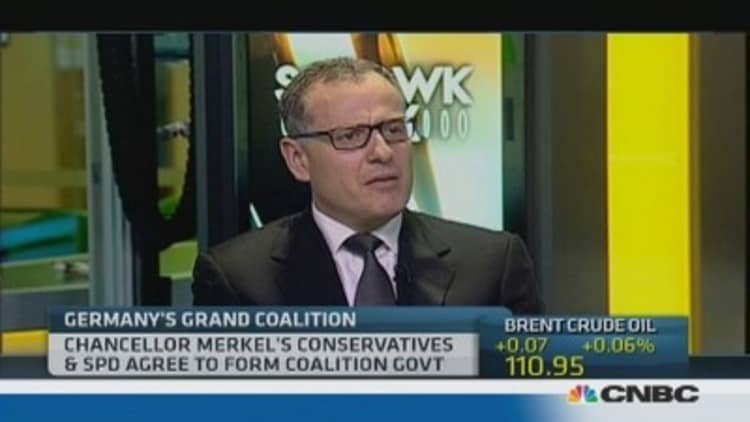
After two months of protracted negotiations, Germany's two most popular parties finally formed a so-called "grand coalition" Wednesday, in a move that could determine how quickly the euro zone's financial problems will be solved.
(Read more: Germany's coalition deal)
While European markets were expected to open higher following the news, many analysts forecast there won't be that much change. After all, it has been clear from September's election that Angela Merkel will continue to lead the country, since her Christian Democrats (CDU) captured by far the most votes. And while the Social Democrats (SPD), who are joining her in coalition, are more left-wing, there are few real differences in their attitudes towards Germany's place in the euro zone.
Nonetheless, there are still problems in the region that require Germany's attention -- including the region's sluggish growth and the long-delayed attempts to overhaul and bolster its banking system.
The new coalition deal could be a "missed opportunity" to change Germany, according to Carsten Brzeski, economist at ING.
"It looks as if the new government's focus is on redistributing the harvest of earlier economic reforms, rather than using the economic good times for new structural reforms, increasing the economy's potential growth rate," he said.
Germany has led the euro zone's rescue plan for its bailed-out peripheral economies in the past few years, with the largest financial contribution from any country to the bailout, but its emphasis on public spending cuts to reduce country's deficits and a reluctance to impose a Europe-wide bank resolution system has been criticized.
"The real risk going forward is an even greater unwillingness of the new coalition to mutualise the fall-out from Europe's persistent banking problems," Carsten Nickel, Germany analyst & senior vice president at Teneo Intelligence, pointed out.
(Read more: Merkel gets a mandate, but market reaction muted)
Other key points markets will be watching for during the announcement of the coalition government are whether a new Finance Minister will be appointed. Another flashpoint could be whether the SPD has won the argument on whether to install a minimum wage of 8.5 euros ($11.57) per hour – one of the highest in the euro zone. A full announcement is expected Wednesday around noon CET.
Despite its fiscal solidity, economic strength and leadership within the euro zone, Germany has faced attacks in recent weeks.
The European Commission is investigating whether the budget surplus it runs, which means that its exports regularly outstrip imports, is damaging the rest of the euro zone.
(Read more: Germany is 'ripping off' the world)
The arguments put forward by Germany's critics are that it has benefited from the weaker euro through boosted exports, but has not helped out its weaker euro zone partners sufficiently. Some argue that boosting wages, for example, might encourage German consumers to buy imported goods.
Former Spanish Prime Minister Jose Luis Rodriguez Zapatero told CNBC: "The monetary policy of low interest rates - followed since the birth of the euro right up till the crisis - was designed for the German reconstruction. But what effects did it have for countries like Spain? It created a huge expansion of credit… which created bubbles."
(Read more: The euro was made for Germany, not Spain: Ex-Spanish PM)
German politicians have answered such criticism by arguing that other euro zone countries, particularly the more heavily indebted peripheral economies like Greece and Spain, should try to become more like Germany.
(Read more: Why Europe should copy, not criticize Germany's surplus)
"There are clearly signs of adjustment fatigue in some of these peripheral economies," Michael Ingram, market analyst at BGC Brokers, told CNBC.
"The periphery is trying to deflate against Germany and that's difficult."
- By CNBC's Catherine Boyle. Twitter: @cboylecnbc.


